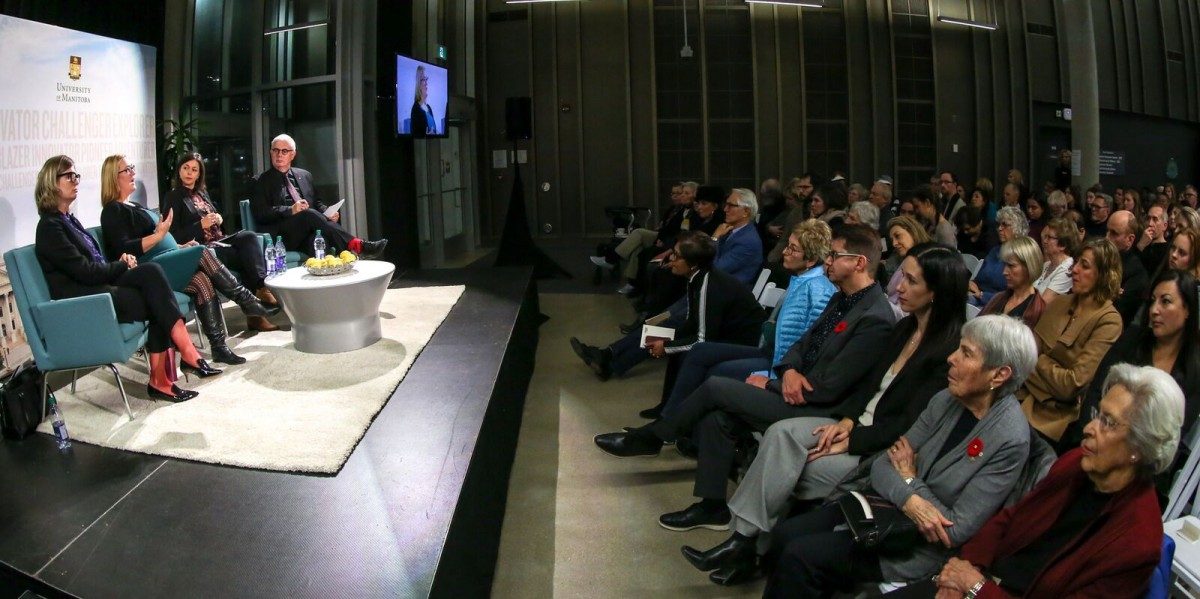
The power of 400
Visionary Conversations talks global citizenship
Shaden Abusaleh [B.A.(Adv.)/2018] knows big impact starts small.
As one of the attendees who came together for last night’s Visionary Conversations event The power of one: what’s my responsibility as a global citizen? hosted by Dr. David Barnard, she joined more than 400 students, alumni and members of the U of M community to hear from panelists Nahlah Ayed [BSc(Hons)/92, MA/02, LLD(Hon)/08], Laura Michalchyshyn [BA/89] and Brenda Gunn [BA(Adv)/02] on global citizenship and empowering the individual to take action.
Now an alumna, one of Abusaleh’s first steps into global citizenship was co-founding Sawa Theatre while in her second year in the Faculty of Arts Global Political Economy program at the U of M. The program, named after the Arabic word for ‘togetherness,’ bridges the gap between newcomers and local Canadians by using theatre to “break harmful stereotypes in a world of growing intolerance.”
A past nominee of the Nahlah Ayed Student Award; Abusaleh shared her perspective on the power of one: “being able to be impactful or create change doesn’t have to be grandiose; it starts with small steps, small projects which are the beauty of grassroots movements like Sawa.”
In a full venue at the Active Living Centre’s Alumni Association Agora, the panel worked through the vast issues facing communities around the globe like intolerance and anti-immigration sentiments, climate change, violence, and the influence of media and digital tools- and how small steps made by an individual can galvanize whole communities to make positive change.
Ayed, an award-winning foreign correspondent with CBC News, began the conversation that weaved through these complex issues with stories of inspiration from students like Abusaleh on to define ‘the power of one’ and global citizenship, noting:
“There’s no right or wrong way to be a global citizen; rather, it’s a way of thinking and a way of living – it’s seeing yourself within the greater whole and the greater solutions.”
While questions from the audience addressed broad and sweeping issues affecting global communities like climate change and the #MeToo movement, a theme emerged of wanting to reconcile responsibilities into tangible steps to make a difference.
There was no shortage on ideas for calls to action from the panelists.
Ayed acknowledged that privilege can affect the ability to act and influence others, but that seeking out information and being informed on issues beyond our borders is an action well within our reach.
“Information can change what you buy, how you vote, what you tell your neighbours, and yes sometimes it compels people to move and do extraordinary things.”
Brenda Gunn, Associate Professor in Robson Hall Faculty of Law, followed suit with a personal story and recommendation on knowing our local history as it relates to Indigenous rights.
“It’s our responsibility to know our history to understand the issues that are facing Canada but also the world. What are our issues here and then work out from there,” said Gunn.
“By recognizing the rights and histories of Indigenous peoples we begin the process of shifting the relationship to one of respect and mutual understanding.”
Michalchyshyn, an accomplished media executive and producer living in New York , rounded out these calls to action with her experience as a storyteller:
“What I’ve learned in that career in media: it takes one person sharing their story to make positive change … By telling the truth and searching for those stories, truth and justice will prevail.”
Social media networks and digital tools dominated as concerns, particularly trends like “clicktivism” or “slacktivsm,” with Dr. Barnard asking whether online involvement really empowers an individual, or whether we’re “fooling ourselves” in thinking online actions make a difference.
Michalchyshyn and Ayed credited social media tools as being a gateway to activism, citing examples like the #MeToo movement.
“Clicking and saying ‘I believe her’ made a massive difference,” said Ayed. “The very rudimentary act helped thousands of young men and women and tell their stories which also included others and encouraged them to tell their stories.”
Gunn added that online platforms have helped extend news cycles as users share stories, helping social issues remain top-of-mind.
As the audience looked to Ayed, Michalchyshyn, and Gunn for advice and expertise on leadership and change, the gaze shifted to students and young alumni like Abusaleh; Michalchyshyn advocated for millennials as being the generation that will change the world.
“The 18-35 age group is the most stimulated by social media but they have a different set of values. They care about what’s happening for people of colour, women’s rights, the realities of immigration, etc.”
With Sawa Theatre is entering its third year of connecting and supporting newcomers through theatre programming and workshops to break down barriers between communities, it’s one example of a project that brings together all of the themes from the discussion on the ‘power of one’ and how to act locally, but think globally:
“The beauty about a project like Sawa is that it started very local,” said Abusaleh. “It was grassroots – a bunch of university friends and community members who came together and wanted to make an impact.”
Visionary Conversations is a series that brings people together to explore tough questions and foster conversations that drive discovery and insight. Read more about Visionary Conversations and follow the conversation on Twitter using #umvisionary.
Watch the full video of Visionary Conversations below:







As an alumnus, I am very proud of my Alma Mater.
Congrats to all.